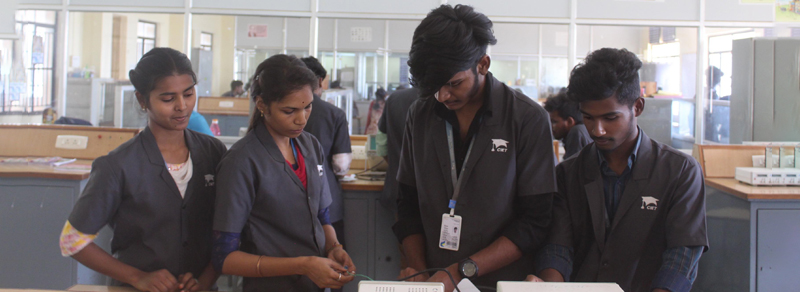
The Department of Electronics Engineering (VLSI Design and Technology) has been established in the year 2024 with an intake of 60 undergraduate students. The Electronics Engineering (VLSI Design and Technology) program at Coimbatore Institute of Engineering and Technology focuses on teaching essential principles in the Electronics, Signal Processing, Design of VLSI Circuits, Systems, and Technology. The curriculum is tailored to meet the dynamic requirements of the VLSI industry and societal needs, with a strong emphasis on research and innovation. The VLSI discipline integrates the design and verification of electronic systems and circuits, with applications extending to various fields such as signal and image processing, networks and communications, space technology, IC design, and quantum computing. The program provides a solid foundation in electronics engineering while offering specialized VLSI courses to enhance students' expertise, preparing them for careers in the core VLSI sector.
Empowering VLSI engineering students to excel in semiconductor design and testing through academic excellence, practical skill development, and a focus on personal growth and ethical values for successful entrepreneur and industry careers.
MS 1: To foster technical ingenuity in VLSI Design and Technology through academic excellence, continuous assessment, and interactive seminars and workshops.
MS 2: To nurture practical skills in VLSI Design and Technology through hands-on laboratory exercises, in-plant training, and industry visits, enhancing communication abilities both verbally and in writing.
MS 3: To instill self-confidence, self-motivation, and an optimistic outlook in students pursuing VLSI Design and Technology, while emphasizing strong ethical and social values through self-development programs.
The following Programme Educational Objectives are designed based on the department Mission
PEO1: Employment:
PEO2: Enhancement:
PEO3:Advancement:
PO1 Engineering Knowledge: Apply knowledge of mathematics, natural science, computing, engineering fundamentals and an engineering specialization as specified to develop to the solution of complex engineering problems.
PO2 Problem Analysis: Identify, formulate, review research literature and analyze complex engineering problems reaching substantiated conclusions with consideration for sustainable development.
PO3 Design/Development of Solutions: Design creative solutions for complex engineering problems and design/develop systems/ components /processes to meet identified needs with consideration for the public health and safety, whole-life cost, net zero carbon, culture, society and environment as required.
PO4 Conduct Investigations of Complex Problems: Conduct investigations of complex engineering problems using research-based knowledge including design of experiments, modelling, analysis & interpretation of data to provide valid conclusions.
PO5 Engineering Tool Usage: Create, select and apply appropriate techniques, resources and modern engineering & IT tools, including prediction and modelling recognizing their limitations to solve complex engineering problems.
PO6 The Engineer and The World: Analyze and evaluate societal and environmental aspects while solving complex engineering problems for its impact on sustainability with reference to economy, health, safety, legal framework, culture and environment.
PO7 Ethics: Apply ethical principles and commit to professional ethics, human values, diversity and inclusion; adhere to national & international laws.
PO8 Individual and Collaborative Team work: Function effectively as an individual, and as a member or leader in diverse/multi-disciplinary teams.
PO9 Communication: Communicate effectively and inclusively within the engineering community and society at large, such as being able to comprehend and write effective reports and design documentation, make effective presentations considering cultural, language, and learning differences.
PO10 Project Management and Finance: Apply knowledge and understanding of engineering management principles and economic decision-making and apply these to one’s own work, as a member and leader in a team, and to manage projects and in multidisciplinary environments.
PO11 Life-Long Learning: Recognize the need for, and have the preparation and
ability for
i) independent and life-long learning
ii) adaptability to new and
emerging technologies and
iii) critical thinking in the broadest context of
technological change.
PSO1: Develop problem-solving skills
PSO2: Acquire professional skills
PSO3: Prepare students for successful careers and entrepreneurship
